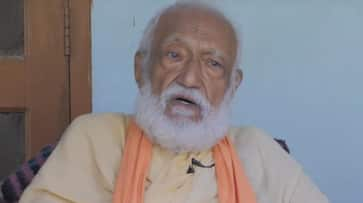The 86-year-old seer, who had been fasting since June 22, was demanding a law to save the river and maintain uninterrupted flow between Gangotri and Uttarkashi. He had also demanded a ban on mining and hydropower projects on the Ganga
New Delhi: Environmentalist GD Agarwal, also known as Swami Gyan Swaroop Sanand, who was on an indefinite fast demanding a cleaner river Ganga, died at the AIIMS in Rishikesh on Thursday after being on a fast for 109 days.
The 86-year-old seer, who had been fasting since June 22, was demanding a law to save the river and maintain uninterrupted flow between Gangotri and Uttarkashi. He had also demanded a ban on mining and hydropower projects on the Ganga.
Agarwal was consuming water mixed with honey during the fast, but stopped that too after the failure of talks with the government.
The former IITian was also a member-secretary of the Central Pollution Control Board or CPCB.
According to reports, Agarwal suffered a heart attack and died at 1 pm on Thursday.
Agarwal was not the only person who died saving river Ganga. There are others who have met the same fate.
In 2014, Baba Nagnath Yogeshwar died in a state-run hospital in Varanasi after fasting for over six years. He had demanded clean and uninterrupted flow of the Ganga water.
Swami Nigmananda was another Ganga crusader sacrificed his life for the cause of the Ganga. He died in 2011 while protesting against illegal mining on the bank of Ganga in Uttarakhand. He lost his life after fasting for 115 days.
Where do we stand now?
Though the Narendra Modi-led BJP promised to clean up the Ganga by 2019 ahead of 2014 Lok Sabha elections, it is now a pressing question whether the government will be able to meet the deadline.
The Hindustan Times, citing data from the National Mission for Clean Ganga (NMCG), reported that there has been improvement on certain parameters like dissolved oxygen (DO) and biological oxygen demand (BOD) since 1986, but the implementation wing of the National Ganga Council have kept mum about the faecal coliform level, which is crucial for determining if the water is fit for drinking and bathing.
Meanwhile, senior scientist at CPCB RM Bhardwaj said that it is too soon to pass a judgment.
“There have been some improvement but again there are fluctuations. There has been no change in waste generation. Efforts are being made to treat the waste by setting up sewage treatment plants (STPs) but it will take time. The faecal coliform level needs improvement,” The Hindustan Times quoted Bhardwaj as saying.
The daily also quoted environmental activist MC Mehta as saying that last year’s CAG report showed the quality of the river having deteriorated over the years.
“The CPCB data for DO and BOD do not reflect the true picture, which will be clear only when the figures for faecal coliform are also disclosed,” said Mehta.
Last Updated Oct 11, 2018, 7:41 PM IST









![Salman Khan sets stage on fire for Anant Ambani, Radhika Merchant pre-wedding festivities [WATCH] ATG](https://static-gi.asianetnews.com/images/01hr1hh8y86gvb4kbqgnyhc0w0/whatsapp-image-2024-03-03-at-12-24-37-pm_100x60xt.jpg)
![Pregnant Deepika Padukone dances with Ranveer Singh at Anant Ambani, Radhika Merchant pre-wedding bash [WATCH] ATG](https://static-gi.asianetnews.com/images/01hr1ffyd3nzqzgm6ba0k87vr8/whatsapp-image-2024-03-03-at-11-45-35-am_100x60xt.jpg)


